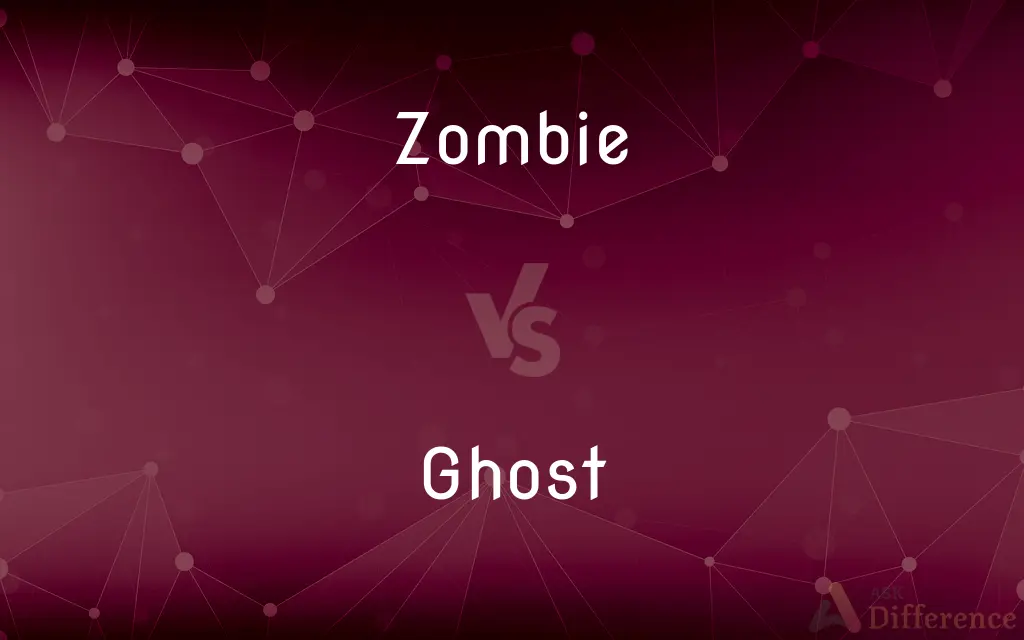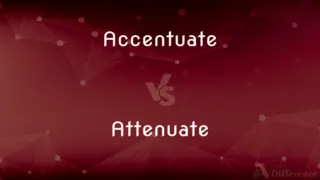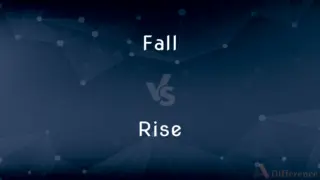Zombie vs. Ghost — What's the Difference?
By Maham Liaqat & Urooj Arif — Updated on April 26, 2024
Zombies are corporeal, reanimated afterlife with a physical presence, driven by basic needs; ghosts are incorporeal spirits of the deceased, often tied to specific locations or emotional states.

Difference Between Zombie and Ghost
Table of Contents
ADVERTISEMENT
Key Differences
Zombies are typically portrayed as reanimated corpses that are physically present and often driven by a primal urge, usually to consume human flesh. They are depicted with a tangible body that interacts with the physical world. Ghosts, on the other hand, are spiritual entities believed to be the souls or spirits of deceased persons. They are usually intangible and can pass through solid objects, often not bound by physical laws.
While zombies are often shown as lacking consciousness and individuality, acting primarily on instinct without any awareness of their previous lives, ghosts are frequently depicted as retaining their personalities and memories. This allows them to engage with living characters in a more complex and emotionally driven manner, whereas zombies typically do not have such depth.
Zombies are generally created through biological means, such as a virus or a contagion that spreads from one person to another, effectively making them part of an "outbreak." This contrasts with ghosts, which are often tied to supernatural or metaphysical phenomena without any grounding in science. Ghosts might appear due to unfinished business, a traumatic event, or the violation of a tomb or sacred site.
In popular culture, zombies pose a physical threat to the living, often resulting in apocalyptic scenarios where survival revolves around evading or fighting these creatures. Ghosts, however, are more commonly associated with psychological terror and haunting, where the fear is derived from their unsettling presence and supernatural activities rather than direct physical harm.
Zombies are a relatively modern concept in folklore and media, with their popularity soaring in the 20th century through films and literature. Ghosts have been a part of human folklore and storytelling for centuries across various cultures, often imbued with deeper moral or spiritual lessons.
ADVERTISEMENT
Comparison Chart
Physicality
Corporeal and tangible.
Incorporeal and intangible.
Origin
Often biological (e.g., a virus).
Supernatural or metaphysical.
Interaction
Physical interaction (e.g., biting).
Can pass through objects, less physical interaction.
Consciousness
Lacks individual consciousness.
Often retains personality and memories.
Threat Type
Physical threat and violence.
Psychological terror and haunting.
Compare with Definitions
Zombie
Figuratively, an unresponsive person.
I feel like a zombie after that meeting.
Ghost
Visible but intangible being.
A ghost appeared in the photograph.
Zombie
A creature from horror and fantasy.
The zombie apocalypse is a popular theme in literature.
Ghost
Often linked to specific locales.
That cemetery is known for its ghost sightings.
Zombie
Mindless being driven by basic instincts.
He walked like a zombie before his morning coffee.
Ghost
Associated with hauntings and supernatural phenomena.
The ghostly figure vanished into thin air.
Zombie
Virally infected human.
The virus turned them into zombies.
Ghost
Manifestation of the deceased.
They say the ghost of the founder still roams these halls.
Zombie
Reanimated corpse that consumes the living.
Zombies in the movie attacked the town.
Ghost
Act as ghostwriter of (a work)
His memoirs were smoothly ghosted by a journalist
Zombie
A corpse said to be revived by witchcraft, especially in certain African and Caribbean religions.
Ghost
Glide smoothly and effortlessly
They ghosted up the river
Zombie
A cocktail consisting of several kinds of rum, liqueur, and fruit juice.
Ghost
End a personal relationship with (someone) by suddenly and without explanation withdrawing from all communication
I didn't want to ghost her, so we ended up having ‘the talk’ and it was horrible
People who ghost are primarily focused on avoiding their own emotional discomfort
Being ghosted is one of the toughest ways to be dumped
Zombie
In voodoo belief and popular folklore, a corpse that has been reanimated, especially by means of a supernatural power or spell.
Ghost
A person's spirit or soul
Was sick for months and finally gave up the ghost.
Zombie
One who looks or behaves like an automaton.
Ghost
A returning or haunting memory or image.
Zombie
A computer connected to the internet and controlled by a remote unauthorized user to perform malicious tasks, without the owner being aware.
Ghost
A slight or faint trace
Just a ghost of a smile.
Zombie
A bank or business that cannot meet its financial obligations or make new loans but has been allowed to continue operating by the government.
Ghost
The tiniest bit
Not a ghost of a chance.
Zombie
A snake god of voodoo cults in West Africa, Haiti, and the southern United States.
Ghost
An unwanted image on a television or radar screen caused by reflected waves.
Zombie
A tall mixed drink made of various rums, liqueurs, and fruit juices.
Ghost
A displaced image in a photograph caused by the optical system of the camera.
Zombie
(figuratively) An apathetic or slow-witted person.
Ghost
An unwanted spectral line caused by imperfections in a diffraction grating.
Zombie
(figuratively) A human being in a state of extreme mental exhaustion.
After working for 18 hours on the computer, I was a zombie.
Ghost
A displaced image in a mirror caused by reflection from the front of the glass.
Zombie
An information worker who has signed a nondisclosure agreement.
Ghost
(Informal) A ghostwriter.
Zombie
(computing) A process or task which has terminated but has not been removed from the list of processes, typically because it has an unresponsive parent process.
Ghost
A nonexistent publication listed in bibliographies.
Zombie
(computing) A computer affected by malware which causes it to do whatever the attacker wants it to do without the user's knowledge.
Ghost
A fictitious employee or business.
Zombie
A cocktail of rum and fruit juices.
Ghost
(Physiology) A red blood cell having no hemoglobin.
Zombie
A conscripted member of the Canadian military during World War II who was assigned to home defence rather than to combat in Europe.
Ghost
(Informal) To engage in ghostwriting.
Zombie
Marijuana, or similar drugs.
Ghost
To move noiselessly like a ghost
“Two young deer ghosted out of the woods” (Nancy M. Debevoise).
Zombie
(philosophy) A hypothetical being that is indistinguishable from a normal human being except in that it lacks conscious experience, qualia, or sentience.
Ghost
To haunt.
Zombie
A god of voodoo cults of African origin worshipped especially in West Indies
Ghost
(Informal) To ghostwrite
Was hired to ghost the memoirs of a famous executive.
Zombie
Someone who acts or responds in a mechanical or apathetic way;
Only an automaton wouldn't have noticed
Ghost
The spirit; the human soul.
Zombie
Several kinds of rum with fruit juice and usually apricot liqueur
Ghost
Any faint shadowy semblance; an unsubstantial image.
Not a ghost of a chance
The ghost of an idea
Ghost
A false image formed in a telescope, camera, or other optical device by reflection from the surfaces of one or more lenses.
Ghost
An unwanted image similar to and overlapping or adjacent to the main one on a television screen, caused by the transmitted image being received both directly and via reflection.
Ghost
A ghostwriter.
Ghost
A nonexistent person invented to obtain some fraudulent benefit.
Ghost
(Internet) An unresponsive user on IRC, resulting from the user's client disconnecting without notifying the server.
Ghost
(computing) An image of a file or hard disk.
Ghost
(theatre) An understudy.
Ghost
(espionage) A covert (and deniable) agent.
Ghost
The faint image that remains after an attempt to remove graffiti.
Ghost
(video games) An opponent in a racing game that follows a previously recorded route, allowing players to compete against previous best times.
Ghost
Someone whose identity cannot be established because there are no records of him/her.
Ghost
(quantum physics) An unphysical state in a gauge theory.
Ghost
A formerly nonexistent character that was at some point mistakenly encoded into a character set standard, which might have since become used opportunistically for some genuine purpose.
Ghost
(countable) ghost pepper
Ghost
(uncountable) A game in which players take turns to add a letter to a possible word, trying not to complete a word.
Ghost
White or pale.
Ghost slug
Ghost
Transparent or translucent.
Ghost ant
Ghost catfish
Ghost
(attributive) Abandoned.
Ghost town
Ghost ship
Ghost
(attributive) Remnant; the remains of a(n).
Ghost cell
Ghost crater
Ghost image
Ghost
(attributive) Perceived or listed but not real.
Ghost cellphone vibration
Ghost pain
Ghost island
Ghost voter
Ghost
(attributive) Of cryptid, supernatural or extraterrestrial nature.
Ghost rocket
Ghost deer
Ghost
(attributive) Substitute.
Ghost writer
Ghost singer
Ghost
To haunt; to appear to in the form of an apparition.
Ghost
(obsolete) To die; to expire.
Ghost
(literary) To imbue with a ghost-like hue or effect.
Ghost
(ambitransitive) To ghostwrite.
Ghost
(nautical) To sail seemingly without wind.
Ghost
(computing) To copy a file or hard drive image.
Ghost
(GUI) To gray out (a visual item) to indicate that it is unavailable.
Ghost
To forcibly disconnect an IRC user who is using one's reserved nickname.
Ghost
(intransitive) To appear or move without warning, quickly and quietly; to slip.
Ghost
(transitive) To transfer (a prisoner) to another prison without the prior knowledge of other inmates.
Ghost
(slang) To kill.
Ghost
To perform an act of ghosting: to break up with someone without warning or explanation; to ignore someone, especially on social media.
Ghost
(film) To provide the speaking or singing voice for another actor, who is lip-syncing.
Ghost
The spirit; the soul of man.
Then gives her grieved ghost thus to lament.
Ghost
Any faint shadowy semblance; an unsubstantial image; a phantom; a glimmering; as, not a ghost of a chance; the ghost of an idea.
Each separate dying ember wrought its ghost upon the floor.
Ghost
A false image formed in a telescope by reflection from the surfaces of one or more lenses.
And he gave up the ghost full softly.
Jacob . . . yielded up the ghost, and was gathered unto his people
Ghost
To die; to expire.
Ghost
To appear to or haunt in the form of an apparition.
Ghost
A mental representation of some haunting experience;
He looked like he had seen a ghost
It aroused specters from his past
Ghost
A writer who gives the credit of authorship to someone else
Ghost
A suggestion of some quality;
There was a touch of sarcasm in his tone
He detected a ghost of a smile on her face
Ghost
Move like a ghost;
The masked men ghosted across the moonlit yard
Ghost
Haunt like a ghost; pursue;
Fear of illness haunts her
Ghost
Write for someone else;
How many books have you ghostwritten so far?
Common Curiosities
What defines a zombie in folklore and media?
A zombie is a reanimated corpse known for its mindless state and hunger for human flesh.
What cultural role do ghosts play in storytelling?
Ghosts are used to explore themes of afterlife, morality, and human emotion, often serving as a narrative device for cautionary tales.
Can zombies communicate in popular culture?
In most depictions, zombies do not communicate and act primarily on instinct.
How does a ghost interact with the physical world?
Ghosts are typically unable to physically interact with the world, moving through objects instead.
How do zombies spread their condition?
Zombies often spread their condition through biting or transferring a contagion.
How do ghosts and zombies differ in terms of threat?
While zombies are a physical threat, ghosts are more about psychological terror and supernatural disturbances.
What are common elements in ghost stories?
Common elements include hauntings, spectral apparitions, and interactions with the living in a non-physical manner.
Are zombies aware of their former lives?
Zombies generally lack any awareness or memories of their previous existence.
How has the concept of zombies evolved in modern media?
The modern concept of zombies has evolved from mindless creatures to sometimes include variants with different characteristics or origins.
Are zombies considered supernatural?
Zombies are typically not considered supernatural but are often the result of a scientific anomaly like a virus.
Can ghosts be seen by everyone?
Ghost sightings are subjective and often tied to specific people or locations.
What is the main threat posed by zombies?
Zombies pose a direct physical threat, often leading to violent confrontations.
What psychological themes do ghost narratives explore?
Ghost narratives often explore themes of loss, grief, remembrance, and the unresolved past.
Share Your Discovery

Previous Comparison
Accentuate vs. Attenuate
Next Comparison
Fall vs. RiseAuthor Spotlight
Written by
Maham LiaqatCo-written by
Urooj ArifUrooj is a skilled content writer at Ask Difference, known for her exceptional ability to simplify complex topics into engaging and informative content. With a passion for research and a flair for clear, concise writing, she consistently delivers articles that resonate with our diverse audience.
















































